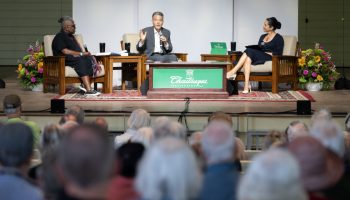
Nomi Prins will speak on the permanent distortion between the financial market and the real economy at 10:45 a.m. today in the Amphitheater, continuing Chautauqua Lecture Series’ Week Five theme, “Innovation in Capitalism: How to Meet 21st-Century Challenges?”
“Permanent distortion … is still unfolding, but at the same time, we’re in a different part of that cycle, and what comes next, I believe, very much ties into the theme of this lecture series,” Prins said. “… What is the situation realistically? Why are we in this situation? How is it shifting, and what role do we need to play and (what) does our government need to do in order to secure future economic development for the economic and public good of the country?”
Prins is an economist, author, financial historian and geopolitical financial expert. A Wall Street insider, she held positions at Lehman Brothers and Chase Manhattan Bank, as well as senior roles at Goldman Sachs and Bear Stearns in London. Prins left Wall Street to draw attention to the manipulation of financial systems and coined the concept “permanent distortion” to educate people on the gap between financial markets and the real economy.
She has authored many books, including Permanent Distortion: How Financial Markets Abandoned the Real Economy Forever, Collusion: How Central Bankers Rigged the World, It Takes a Pillage: Behind the Bonuses, Bailouts, and Backroom Deals from Washington to Wall Street and Other People’s Money: The Corporate Mugging of America.
Prins described permanent distortion as “where reality falls” amidst the difference between the financial market and the real economy.
“Permanent distortion is basically that disconnect between the behavior and levels of markets — stock markets and other forms of securities markets, but particularly stock markets — that everybody knows and sees headlines for all the time, and what is felt and what is real in the economic lives of Americans and real people,” Prins said. “The reason for that disconnect is, broadly, because the world of Wall Street, as it’s subsidized by the federal reserve and by extension of central banks in their financial systems around the world, gears itself towards rewarding speculation at the expense of real, planned, economic long-term development, such as infrastructure and energy and the intersection of social and economic necessities like hospital, schools, affordable housing.”
Prins’ time working on Wall Street provided her with an inside perspective on how that distortion happens.
“I ran group and structured deals, and so what that meant was financial engineering (of) products on top of financial engineering of products that had nothing real attached to them,” Prins said. “When you do that, when you can afford to do that, and when you’re bailed out to do that and when there’s still $6.8 trillion worth of debt subsidizing that on the book of the federal reserve, then you take risks. You don’t worry about building, and you use that money to lobby and you use that money to buy back stock and you do that with your clients, whether it’s in tech or AI firms or whatever it might be. The combination of all of that contributes to a stock market.”
Such financial practices, driven not by innovation but through leverage and policy incentives, fuel this economic gap between appearance and substance.
“You get to the point where the value of companies doesn’t actually match what they’re producing,” Prins said. “But if they’re rewarded in an outsized capacity because the money and the leverage and the regulations are all pointing in the direction of that being the case, you don’t look at the long-term as much — not not at all, but not as much — and therefore that distortion gets wider and wider.”
Still, Prins suggests that this time of instability could be one of redirection, as well.
“We are at a moment where things are shifting, but we need to have the wisdom, and the courage and the push to shift them in the right direction,” Prins said. “That requires some bold moves and to basically be cognizant of the fact that bold has happened, it needs to happen, and seeds are there to make it happen, but there’s a lot of work that needs to be done.”




